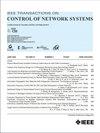Clock Synchronization With Unknown and Unmodeled Disturbances Over Distributed Networks
IF 5
3区 计算机科学
Q2 AUTOMATION & CONTROL SYSTEMS
引用次数: 0
Abstract
The clock synchronization problem has garnered significant attention in the field of multiagent systems due to its aim of establishing a common and reliable framework for facilitating cooperation among different agents. In contrast to previous studies, our primary focus lies in addressing the following question: When we lack prior knowledge about disturbances, what synchronization performance can we achieve compared to a hindsight-based approach? To tackle this challenge, we introduce the concept of分布式网络上未知和未建模干扰的时钟同步
时钟同步问题在多智能体系统领域引起了广泛的关注,因为它的目的是建立一个共同的、可靠的框架来促进不同智能体之间的合作。与以前的研究相反,我们的主要焦点在于解决以下问题:当我们缺乏关于干扰的先验知识时,与基于后见之明的方法相比,我们可以实现什么样的同步性能?为了应对这一挑战,我们引入了后悔的概念作为一个度量来建模和量化我们的问题,独立于任何关于干扰的假设。我们将后悔定义为偏离理想同步结果的度量。此外,我们还证明了该问题固有地具有一个不受干扰影响的后悔下界。通过适当设置后悔要求,我们可以将问题等效地转化为$\mathcal {H}_\infty$最优控制问题,从而确定相应的同步策略。通过仿真,我们验证了该方法的有效性,证明了其优于现有方法。
本文章由计算机程序翻译,如有差异,请以英文原文为准。
求助全文
约1分钟内获得全文
求助全文
来源期刊

IEEE Transactions on Control of Network Systems
Mathematics-Control and Optimization
CiteScore
7.80
自引率
7.10%
发文量
169
期刊介绍:
The IEEE Transactions on Control of Network Systems is committed to the timely publication of high-impact papers at the intersection of control systems and network science. In particular, the journal addresses research on the analysis, design and implementation of networked control systems, as well as control over networks. Relevant work includes the full spectrum from basic research on control systems to the design of engineering solutions for automatic control of, and over, networks. The topics covered by this journal include: Coordinated control and estimation over networks, Control and computation over sensor networks, Control under communication constraints, Control and performance analysis issues that arise in the dynamics of networks used in application areas such as communications, computers, transportation, manufacturing, Web ranking and aggregation, social networks, biology, power systems, economics, Synchronization of activities across a controlled network, Stability analysis of controlled networks, Analysis of networks as hybrid dynamical systems.
 求助内容:
求助内容: 应助结果提醒方式:
应助结果提醒方式:


